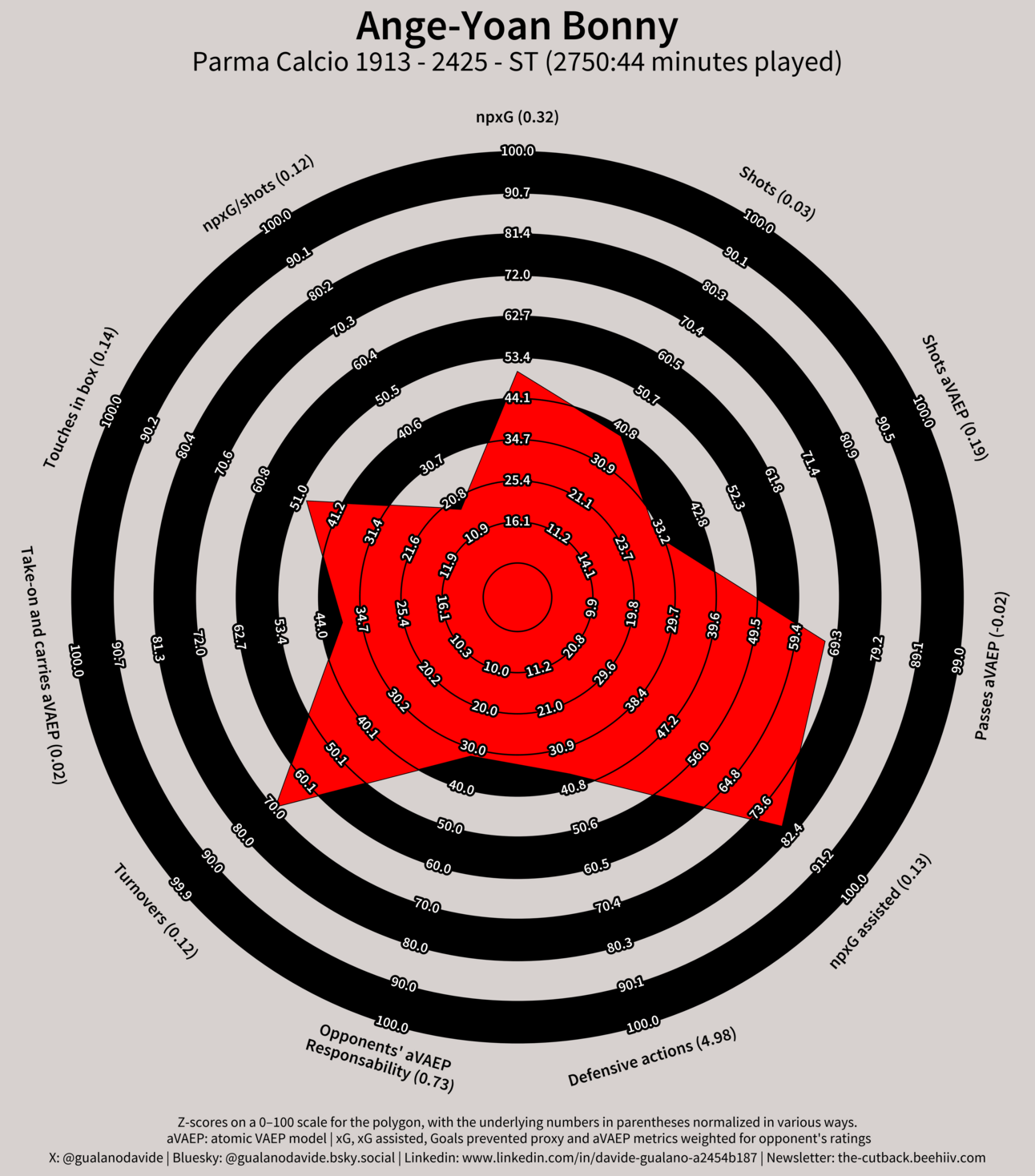- The Cutback
- Posts
- Ange-Yoan Bonny to Inter
Ange-Yoan Bonny to Inter
€25M Project Starting with Poor Conditions
A Project Under Pressure
Let's be clear here: this transfer represents a development project, but one that's beginning under far from ideal conditions for success. Ange-Yoan Bonny arrives at Inter as a striker who will turn 22 in October, yet produces minimal shooting volume and goal output. This immediately raises fundamental questions about both the player's current level and Inter's strategic thinking.
Why would Inter invest €25 million in a striker whose primary attributes don't involve the most essential striker skill - putting the ball in the net?
The logic becomes clearer when examining Inter's specific needs and Bonny's unique profile. The club requires quality substitutes for Thuram and Lautaro while simultaneously developing young players who could eventually challenge for starting positions or be sold. Bonny's age and skill set theoretically address both requirements.
However, his limited goal production stems partly from circumstances beyond individual deficiency. Playing for Parma in a role that didn't prioritize finishing, combined with the team's overall tactical limitations, naturally suppressed his scoring opportunities. And buying early and lower is something Real Madrid built a Champions League winning squad out of.
The Tactical Profile
Bonny's radar reveals a player whose value extends beyond traditional striker metrics, though not necessarily in encouraging ways for a €25 million investment.

His strengths center on qualities that suit Italian football perfectly - the ability to hold ground against physical defenders and recycle possession to teammates. During the first part of the season, he functioned as a classic target man, using his strength to control difficult passes from deep and transform them into meaningful attacking phases.
Under Chivu's management in the second half of the campaign, Bonny evolved into more of a second striker, pressing aggressively while finding pockets of space to facilitate attacking combinations rather than finishing them.
Despite minimal assist and key pass numbers, Bonny demonstrated genuine value in advancing team attacks through indirect contribution.

More significantly, he proved effective at bringing the ball into dangerous areas for teammates, despite operating as the nominal striker.

This ability to create situations rather than finish them suggests a player whose value might be tactical rather than statistical - potentially useful in Inter's system but concerning for his price tag.
Perhaps most troubling for a striker acquisition is Bonny's shooting profile, which reveals concerning patterns, with the biggest represented by his underperformance.

The selection, positioning, and conversion suggest fundamental deficiencies in the primary skill that defines striker value. This represents the type of weakness that coaching can improve but rarely transforms completely.
The Short-Term Reality Check
Unfortunately, despite appreciating Bonny's qualities, this appears to be questionable business, particularly in the immediate term. Multiple factors combine to create an environment where success becomes unlikely despite individual talent.
Inter faces significant transition period with Chivu presenting numerous tactical uncertainties. The squad will undergo substantial changes before the transfer window closes, creating instability that rarely benefits young players requiring development. Most crucially, Bonny's €25 million price tag creates pressure expectations that his current output cannot satisfy.
Bonny possesses qualities that Italian football traditionally values highly. His physical strength allows him to control difficult long balls from deep positions and transform them into productive attacking situations. This skill set would likely make him effective for numerous Serie A teams that prioritize direct play and physical duels.
However, effectiveness doesn't necessarily justify significant investment, particularly when fundamental attacking production remains limited and around him there’s a lot of flux. His profile suggests a player who could become valuable given proper development environment and tactical systems designed around his abilities. The question becomes whether Inter can provide these conditions while managing the pressure that comes with expensive acquisitions and winning trophies.
Therefore if Inter think he’s going to help them win in this new era it’s gonna be a no from me, if they think of him as a multi-year project… well, maybe.
Well… This would be my last post before going on vacation, so I’ll be radio silent until August! Hear from me soon and thanks for the attention you gave me so far!